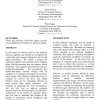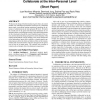85 search results - page 12 / 17 » Architecture for Affective Social Games |
GAMEON
2000
13 years 8 months ago
2000
In this paper we discuss some of the relations between cognition and emotion as exemplified by a particular type of agent architecture, the CogAff agent architecture. We outline a...
AI
2010
Springer
13 years 5 months ago
2010
Springer
Computer systems increasingly carry out tasks in mixed networks, that is in group settings in which they interact both with other computer systems and with people. Participants in...
WSC
2004
13 years 8 months ago
2004
The human behavior modeling community has traditionally been divided into those addressing individual behavior models, and those addressing organizational and team models. And yet...
ATAL
2008
Springer
13 years 9 months ago
2008
Springer
We discuss the design of the Intermediary Agent's brain, the control module of an embodied conversational virtual peer in a simulation game aimed at providing learning experi...
WIOPT
2010
IEEE
13 years 5 months ago
2010
IEEE
—Cognitive radio networks provide the capability to share the wireless channel with licensed (primary) users in an opportunistic manner. Primary users have a license to operate i...




